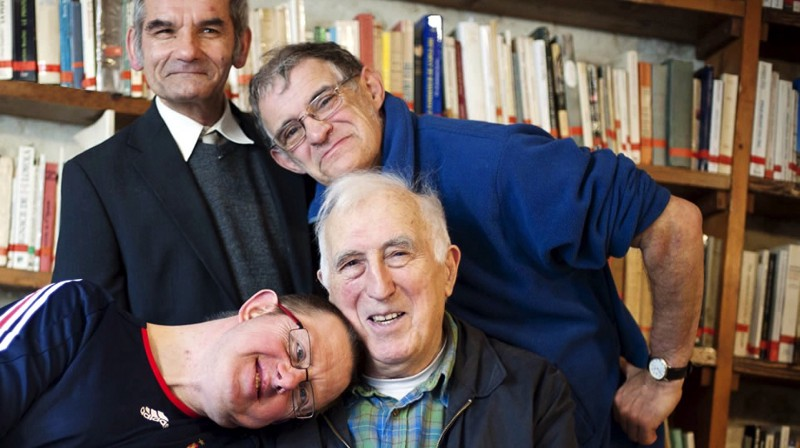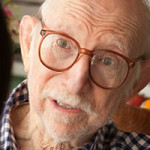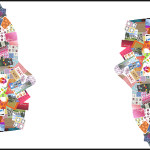
Jean Vanier died in May of this year – a sad day for those who have followed his work and the creation of L’Arche residences for the mentally handicapped.
Krista Tippett interviewed Vanier in 2007 for her On Being broadcast. After hearing of his death, she wrote a commentary on her experience when visiting a L’Arche residence in Iowa. I have excerpted both her introduction to the interview reissue and the transcript of the 2007 interview.
Excerpt from May 2019 OnBeing post
In the early days of my radio adventure, I made a pilgrimage to L’Arche for myself. I traveled to the sleepy town of Clinton, Iowa, on a gorgeous stretch of the Mississippi. There, a revolutionary community shelters among pastel-painted houses on a residential street. It took my eyes and my introverted spirit a little while to adjust to this unfamiliar cross-section of humanity testing the most paradoxical of spiritual teachings – that there is light in darkness, strength in weakness, and beauty in the brokenness of human existence. But their dare does not proceed through theologizing; it proceeds through exuberantly inhabiting the given, imperfect raw materials of the everyday. I’ve rarely been in a place where there is so much laughter and where the rhythm of life includes a real joy in that deceptive phrase, “the simple things of life:” cooking, eating together, washing up; the rituals of leaving for work in the morning and coming home at night; walks around the neighborhood and trips to the library; goofing off and making music and playing. I’ve rarely been hugged so fervently by strangers and enjoyed it. At the same time and not in contradiction to all of that but making it more real, I’ve rarely been in a place where the grief and imperfection and struggle of being human were more honestly faced moment to moment. L’Arche is like family at its best. And it’s a chosen family that then touches the strangers who cross its path. As I moved through the ordinary encounters of ordinary days with L’Arche’s core members, I watched how they unsettled everyone they met, at least a little, and left them more joyful and more graceful: bus drivers, librarians, supervisors at work. And me. It’s a joy and grace transmitted by bodies, and it settled in my bones and is still with me these many years later
“We don’t know what to do with our own weakness except to hide it or pretend it doesn’t exist. So how can we welcome fully the weakness of another if we haven’t welcomes our own weakness?”
~ Jean Vanier
Excerpt from 2007 OnBeing Krista Tippett interview of Jean Vanier
Ms. Tippett: Jean Vanier grew up during World War II, the son of a prominent French Canadian statesman. He still lives in the original L’Arche community in Trosly-Breuil, France. I sat with him in Maryland in 2007, while he was leading a retreat for college students.
The story of L’Arche, which is French for “the ark,” began in 1964. Jean Vanier was a professor of philosophy at St. Michael’s College in Toronto. He had done his doctoral work on happiness in the ethics of Aristotle. At Christmas time that year, he went to visit a friend in France who was working as a chaplain for men with mental handicaps. He was especially moved by a vast asylum south of Paris in which all day, 80 adult men did nothing but walk around in circles and take a two-hour compulsory nap. He bought a small house nearby and invited two men from that asylum to share life with him. This was not a linear career move. Jean Vanier had entered the British Royal Naval College as a teenager and commanded an aircraft carrier in his 20s. When he left the military, before he studied philosophy, he spent a year in a contemplative community in a poor area near Paris. L’Eau Vive, as it was called, “water of life,” was dedicated to serving the poor, praying, and studying metaphysics.
Mr. Vanier: That community near Paris had been founded by a French Dominican priest, and he was very deeply a man of God. I think I had a very open intelligence. Since the age of 13, I had been in the world of the navy. I hadn’t done philosophy; I hadn’t done any particular reading. I was geared for the military. But here was somebody who opened up new visions, new vistas.
(…)
He was a thinker. He was really a man of God. And he was the one who encouraged me to do studies and encouraged me particularly to work on Aristotle. The big thing with Aristotle is the primacy of experience over idea. A lot of people don’t know that.
(…)
Mr. Vanier: For Aristotle, pleasure is not something which is just sort of fooling around. Pleasure is when you have an activity, which you have performed well, be it philosophizing or struggling for justice, whatever you do and you do well — it’s filled with pleasure. It’s joyful, the fulfillment of a desire in an activity you’re doing well.
Ms. Tippett: And what I think is so edifying about talking about that is, often people might say, look at the life you’ve led and the work that you do and contrast that with what they might call our pleasure-seeking, entertainment-oriented society. But what I hear when you talk about Aristotle is, you’re not condemning that basic impulse that we have to seek pleasure. You’re just saying that we can take that to a much deeper and more profound level.
Mr. Vanier: Yes, it’s just finding what activity will give you the greatest, the deepest pleasure. For some people it might be drinking whiskey, rock, and so on. But for me it was to find a meaning through philosophy, through my relationship with Jesus, through justice, through a struggle. And it’s true that I sense deeply that I’ve always been, really, a happy person. That doesn’t mean to say I haven’t had difficulties; that doesn’t mean to say I didn’t go through difficult conflicts or stuff like that. But fundamentally, I’ve had a pleasurable life, a joyful life.
Ms. Tippett: Talk to me, though, about how you connect a word like pleasure and this longing with the place where I really sense you found your calling, you understood what was meaningful for you, when you went back to France, and you encountered men in an asylum. Somehow, you were seized by that, and that has mapped out the direction of your life.
Mr. Vanier: Yes, I come back to the reality of pleasure and to the reality of what is my deepest desire and what is your deepest desire? And somewhere, the deepest desire for us all is to be appreciated, to be loved, to be seen as somebody of value. But not just seen — and Aristotle makes a difference between being admired and being loved. When you admire people, you put them on pedestals. When you love people, you want to be together. So really, the first meeting I had with people with disabilities, what touched me was their cry for relationship. Some of them had been in a psychiatric hospital. All of them had lived pain and the pain of rejection. One of the words of Jesus to Peter —and you find this at the end of the Gospel of Saint John — “Do you love me?”
(…)
Ms. Tippett: (…) You’ve said the whole question is, how do we stand before pain? All kinds of pain and weakness are difficult for us as human beings. Why is that so excruciating? Why do we such a bad job with it?
Mr. Vanier: I think there are so many elements. First of all, we don’t know what to do with our own pain, so what to do with the pain of others? We don’t know what to do with our own weakness except hide it or pretend it doesn’t exist. So how can we welcome fully the weakness of another if we haven’t welcomed our own weakness? There are very strong words of Martin Luther King. His question was always, how is it that one group — the white group — can despise another group, which is the black group? Will it always be like this? Will we always be having an elite condemning or pushing down others that they consider not worthy? And he says something, which is quite, what I find, extremely beautiful and strong — is that we will continue to despise people until we have recognized, loved, and accepted what is despicable in ourselves. So that, then we go down, what is it that is despicable in ourselves? There are some elements despicable in ourselves, which we don’t want to look at, but which are part of our natures, that we are mortal.
We are very fragile in front of the future. Accidents and sicknesses is the reality. We are born in extreme weakness, and our life will end in extreme weakness. People don’t want to hold on to that. They want to prove something. They want security. They want to have big bank accounts and all that sort of stuff — but then, also, hold lots of fears within us. We are a frightened people.
And, of course, the big question is, why are we so frightened of people with disabilities? Like a woman who said to me just recently, asked me what I was doing. I said that I had the privilege of living with people with disabilities. And she said, “Oh, but I could never work with people.” And I said, “Why not?” And she said, “Well, I am frightened of them.”
I believe we’re in front of a mystery of the human reality, and people who are very deeply disfigured in their face, in their body. And it’s the fault of nobody. It’s a reality that is there. Maybe we can work things out and discover what gene it is and so on. But the history of humanity is a history of people being born extremely fragile because sickness and death is part of our reality.
Ms. Tippett: As you’ve also pointed out many times, we all have, what did you say — you called them our weaknesses, our limitations, our disfigurements. They don’t all show on our bodily surface, right? But somehow, we recoil when it shows.
Mr. Vanier: There’s such a need to be appreciated, such a need to be loved. With that sense somewhere that if they see what is broken in me, they’ll no longer love me. So somewhere there has to be a complete change. That we love people not because they’re beautiful or clever, but because they’re a person.
Ms. Tippett: You told a story, when I heard you speak at St. John’s University years ago, about very happy members of your community. Do you remember that story?
Mr. Vanier: Oh, yes. I was sitting and there was a man who was a bit glum like a lot of people, a bit glum. Anyway, there was a knock on the door, and before I could say “Come in,” Jean Claude walked in. Jean Claude technically would be Down syndrome. And Jean Claude shook my hand and laughed, and shook the hand of the other fellow and laughed, and went out laughing. And the man that had been in my office looked at me and said, “Isn’t it sad, children like that?” And what was sad was that he was totally blind. He didn’t see that Jean Claude was happy.
Ms. Tippett: You’ve written that, from the point of view of faith, those who are marginalized and considered failures can restore balance to our world. Talk to me about that.
Mr. Vanier: The balance of our world frequently is seen as a question of power: that if I have more power and more knowledge, more capacity, then I can do more. But does this tension between the doing and the being — and when you have power, we can very quickly push people down. I’m the one that knows, and you don’t know; I’m strong and I’m powerful; I have the knowledge. This is the history of humanity.
And that is all of what I’d call the whole educational system, is that we must educate people to become capable and to take their place in society. That has value, obviously. But it’s not quite the same thing as to educate people to relate, to listen, to help people to become themselves. So the equilibrium that people with disabilities could bring is precisely this equilibrium of the heart.
Ms. Tippett: It seems that you have developed quite an important theology of the body through your work with L’Arche. I think maybe you’re edging towards it there, but it’s bigger than that also.
Mr. Vanier: Yes, L’Arche is not based first on the word. You’ll find lot of communities which are based on the word, thus to say we speak of an ideal together and we are committed to an ideal or to a vision and so on. But L’Arche is based on body and on suffering bodies. They are seen as useless, and so we welcome those who apparently are useless. It’s a suffering body which brings us together. It’s our attention to the body. When somebody comes to our community and is quite severely handicapped, what is important is to see that the body is well. Bathing, helping people dress, to eat: It’s to communicate to them through the body. And then, as the body can become comfortable, then the spirit can rise up. There’s a recognition. There’s a contact. There’s a relationship.
(…)
Ms. Tippett: Our culture says bodies have to be beautiful and faces have to be beautiful, but we also sexualize everything so that touch becomes complicated. Touch was so uncomplicated, and it was also so appropriate.
Mr. Vanier: That has been something very important for me, because in the navy and then the time after the navy, I think I was a little bit frightened of relationships, particularly with women. I was a man who knew how to be efficient and quick. I knew how to teach. I knew how to give commands in the navy. And then starting to live in L’Arche with Raphael and Philippe, it was precisely the realization that what they were crying out for was touch, but also, maybe that’s what I was crying out for — and what I would call safe touch. That’s to say, a touch which gives security and reveals. The way one can put one’s arm around the shoulder of some. It’s not to possess them. It’s not to hold on to them. It’s to reveal.
(…)
It’s the realization of how to create a culture which is no longer a culture just of competition but a culture of welcoming, where tenderness, where touch is important, and it’s neither sexualized nor aggressive. It has become human. I think that this is what people with disabilities are teaching us. It’s something about what it means to be human and to relate and to celebrate life together.
Ms. Tippett: Another piece of wisdom I think about L’Arche is, as you say, its presence, the physical presence. This is another conversation I have with people all the time in different context — that the world’s pain comes to people in Western cultures often through their television sets or through reading some horrific story in a newspaper or seeing an absolutely heartbreaking picture, like a picture I saw of an Iraqi child crying at a funeral the other week that haunted me for days. And yet, there’s nothing I can do for that Iraqi child, you know? He’s thousands of miles away. I think I’m also aware that it’s not only that I can’t touch his pain or the sources of it directly. It’s that I don’t know his sources of solace. I don’t know what’s going to help him get up the next day and somehow start to heal. I’m just, I’m throwing that out…
Mr. Vanier: We are in an incredible world of technology, the global world. And yet, with television and even with cell phones and internet, we can cut away from relationship. To get an email, you don’t see the eyes of the person, you don’t see the face, you don’t see the smile, you don’t see the hands, you don’t see the tone of voice. And we have to come down to small is beautiful because small is where we relate.
Ms. Tippett: Isn’t it funny that global technology may bring us back to small is beautiful.
Mr. Vanier: Possibly. Or take us away from it. As I had said, as you look at that Iraqi child and you were wounded and wanted to do something, yet you were confronted by your incapacity because the child was not in front of you. If that child was in front of you, you could have taken the child in your arms. So we’re going into a world where the imagination, the virtual, the long distance, see things far away, appear as close. But you can’t touch them. They’re close to the imagination, but they’re not close to the body. So let’s come back to the reality of the small.
Ms. Tippett: Like the people who live down the street from us.
Mr. Vanier: We can touch them; we can be with them. The difficulty with L’Arche, which is also a beauty — I say it’s our difficulty, it’s our beauty, is that it’s small, and it’s just very little.
Ms. Tippett: It’s small, and yet the story of L’Arche is that from one community in France, you are now all over the world. You’re in Africa. You’re in Bangladesh. You’ve talked about Calcutta, some of the places you’ve mentioned.
Mr. Vanier: Yes. L’Arche has grown. But the reality of every day is sometimes quite painful in the smallness in a world where people are being pushed to pretend that they’re big.
Ms. Tippett: I think it is. It’s deeply countercultural that you say repeatedly, you don’t want with L’Arche to change the world. That’s not the goal.
Mr. Vanier: What we can do is what Gandhi says: We can’t change the world, but I can change. If I change, and I seek to be more open to people and less frightened of relationship, if I begin to see what is beautiful within them, if I recognize also that there’s brokenness because I’m also broken, and that’s OK, then there’s something that begins to happen.
(…)
Ms. Tippett: What is it you’ve said, that L’Arche is not meant to be a solution but a sign.
Mr. Vanier: Once I was speaking to a man in a big city in the United States. He said, “Give me the formula, and I’ll create 300 L’Arches in the next two years.” I said, “It doesn’t work like that. It’s a transmission of a vision, and it’s counter culture. But that’s OK. Who we are, who we are.”
(…)
Ms. Tippett: I just want to ask you one more question. I’m sure you don’t enjoy being reminded that, like Mother Teresa, in her lifetime, people said she was a saint, and in Jean Vanier’s lifetime, they’re saying that you are a saint. I don’t sense that a lot of your energy has been put into becoming a saint. There was this great shock recently that in Mother Teresa’s letters were revealed that she struggled with darkness and depression, and I wonder how you responded to that.
Mr. Vanier: I knew Mother quite well. She was a fantastic woman. I’d have breakfast with her, and she’d be telling me about her foundation in Yemen and how she was hoping to get to China and what she was doing in Africa and so on. She might have had difficulties in praying but never, never, never did she have the slightest doubt in her mission.
Ms. Tippett: I think somehow the astonishment over that is connected to what you’ve just said, that you are all about loving reality. And she was facing reality. She may have been a saint by some definition, but that doesn’t mean that she was removed from darkness. In fact, it meant that she was actually touching it and facing it and grappling with it.
Mr. Vanier: (…) This is what everybody lives. This is human reality. And I think when Mother Teresa was writing and telling these — and I still feel upset because she said that should be destroyed, and we didn’t take seriously what she had said. But she was obviously a woman of great anguish.
So when you’re greatly anguished, your prayer will be anguished. Don’t be surprised, and don’t make a big thing out of it. This is the reality of everyone. She’s telling us now, stop thinking about this anguish. Just get on and start loving people. We must listen to what she said, which was we will be healed by the poor. So let’s get down to it.
Book: Becoming Human, Jean Vanier






























